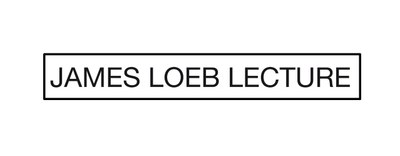James Loeb Lecture

Neben dem James Loeb Fellowship for the Classical Tradition in Art and Architecture veranstaltet das Zentralinstitut für Kunstgeschichte in Kooperation mit der James Loeb Gesellschaft e.V. und dem Harvard Club München e.V. alljährlich einen Vortrag zu Ehren des amerikanischen Mäzens James Loeb.
———————————
In addition to the James Loeb Fellowship for the Classical Tradition in Art and Architecture an annual lecture will take place in honour of the patron James Loeb, organized by the Zentralinstitut für Kunstgeschichte in cooperation with the James Loeb Society e.V. and the Harvard Club e.V. Munich.
James Loeb Lecture 2025 // Johannes Myssok: Die neue(n) Antike(n) des 18. Jahrhunderts
Was passierte im 18. Jahrhundert mit der Antike? Anhand von lange als Antikenfälschungen diffamierten Skulpturen geht der Vortrag dem komplexen Wechselspiel zwischen der Erforschung der Antike und der Restaurierung antiker Fragmente nach. Dabei wird ein neuartiger, imaginativer Umgang mit der Antike sichtbar, der zur Schaffung von Werken führte, die als „neue Antiken“ das antike Fragment zum Ausgangspunkt einer höchst eigenständigen Skulptur nahmen. Neben der Neubewertung dieser Werke und der hiermit verbundenen Fragen um den Status von Original und Kopie entwirft der Vortrag ein neues Bild von der Skulptur im Rom des 18. Jahrhunderts, die lange Zeit als Verfallszeit verstanden worden ist.
James Loeb Lecture 2024 // Ingo Herklotz: Ikonographische Probleme in der frühen Katakombenforschung
Die seit dem Ende des 16. Jahrhunderts in das Blickfeld von Historiographie und Frömmigkeit tretenden Katakomben Roms öffneten die Sicht auf eine unbekannte ikonographische Welt, die zu deuten erstaunlich schwerfiel. Neben dem historischen Bemühen zeugen die unterschiedlichen Interpretationsansätze von dem Versuch, die frühchristlichen Denkmäler im gegenreformatorischen Sinne zu vereinnahmen.
James Loeb Lecture 2023 // Matthias Steinhart: Neupompejanisches Possenspiel. Über antikische Gemälde, archäologische Experimente und wahre Fälschungen im 19. Jahrhundert
Wie erkennt man Fälschungen und warum nicht? Ein neuzeitliches Gemälde mit antikem Motiv führt in die Echtheitsdebatten über römische Malerei des 19. Jahrhunderts.
Panofsky Lecture 2022 | James Loeb Lecture 2022 // Maria Fabricius Hansen: Issues of Translation: ‘Renaissance’, ‘Antique’, and ‘Classical’ revisited
This lecture juxtaposes the conventional definitions of the Renaissance, through its endeavors to revive or renew Roman Antiquity, with observations of paintings and buildings of the fifteenth century in order to reconsider the characteristics of Italian visual culture of the time.
Online | James Loeb Lecture 2021 // Barbara Baert: How Kairos transformed into Occasio (Grisaille, School of Mantegna, 1495-1510)
This lecture features a grisaille fresco depicting the Kairos/Occasio motif (Museo della Città nel Palazzo di San Sebastiano in Mantua). The grisaille illuminates a historical juncture in which the Fortuna/Occasio motif fascinated families of art patrons such as the Gonzagas, Sforzas and Estes. The hybrid forms arose with the new, humanist understanding of human destiny. Likewise, the Mantuan grisaille embodies a modern depiction of mankind and its responsibility to society. The grasping of the moment in the fresco allows us to grasp what ‘opportunity’ embodied for 15th -century aesthetics and ethics (fleeing, nymphean, steady, motion, immobility, youth). [...]
Online | James Loeb Lecture 2020 // Ulrich Pfisterer: Raffael und das Füllhorn der Antike
Im Jahr des 500. Todestages von Raffael untersucht der Vortrag die wegweisende Auseinandersetzung des Urbinaten mit den materiellen Hinterlassenschaften der Antike in Rom.
James Loeb Lecture 2019 // Michael Viktor Schwarz: Giotto ohne Vasari
Vasaris Giotto-Text ist weitgehend fiktional, trotzdem prägt er bis heute den Giotto-Diskurs. Der Vortrag zeigt, wie das Giotto-Bild sich darstellt, wenn man von Vasari konsequent absieht und die Quellen und erschließbaren Kontexte des 14. Jahrhunderts als Basis dienen. Thematisiert wird auch die Differenz zwischen dem Renaissance- und dem Trecento-Giotto.
James Loeb Lecture 2018 // Arnold Nesselrath: "Zeichner sehen die Antike"
Den Pionieren des Antikenstudiums bei ihrem Dialog mit Skulpturen, Bauten oder anderen Überresten zuzusehen, eröffnet wissenschaftliche und bisweilen unterhaltsame Perspektiven. Wissbegierige, Künstler, Forscher, Abenteurer, Vermessungstrupps, Wagehälse, Dilettanten und viele andere unterschiedliche Gemüter haben über die Jahrhunderte hinweg bildliches Material zusammengetragen, wodurch unsere Vorstellung von der Antike beeinflusst wird.
James Loeb Lecture 2017 // Luca Giuliani: Michelangelos David und seine Schleuder
Wie ist Davids Waffe gebildet und wie soll sie funktionieren? In der Antwort darauf liegt ein Schlüssel zum Verständnis der dargestellten Handlung - und der Statue insgesamt.
James Loeb Lecture 2016 // Leonard Barkan: Roman Feasts, Renaissance Imaginations
This lecture asks questions about the relationship between the study of the classical tradition and the practice of interdisciplinarity. The speaker is reflecting on these matters because of his own progression of interests, which began in literature, then embraced the visual arts, and now focuses on the place of eating and drinking in the high culture of antiquity and early modernity. In this talk he will be discussing these matters via a particular emphasis on the question what the Renaissance imagined when they tried to picture an ancient feast.

